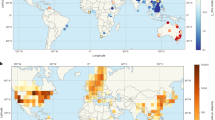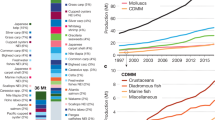Abstract
PERKINS et al.1 suggest that the apparent increase of epidermal lesions in the flatfish of the north-east Irish Sea during 1971 may be associated with pollutants, particularly polychlorinated biphenyls (PCBs). They suggest that the simultaneous increase of lymphocystis, fin damage and ulcers represents an abnormal situation that may have resulted from the increased dumping operations carried out in the Irish Sea over the past few years.
This is a preview of subscription content, access via your institution
Access options
Subscribe to this journal
Receive 51 print issues and online access
$199.00 per year
only $3.90 per issue
Buy this article
- Purchase on Springer Link
- Instant access to full article PDF
Prices may be subject to local taxes which are calculated during checkout
Similar content being viewed by others
References
Perkins, E. J., Gilchrist, J. R. S., and Abbott, O. J., Nature, 238, 101 (1972).
Brinkmann, A., Fauna, Oslo, 15, 36 (1962) (translation No. 825 of the DAFS Marine Laboratory, Aberdeen, dated February 1963).
Woodcock, H. M., Rep. Lancs. Sea-Fish. Lab., 1903, No. 12, 63 (1904).
Johnstone, J., Rep. Lancs. Sea-Fish. Lab., 1904, No. 13, 98 (1905).
Author information
Authors and Affiliations
Rights and permissions
About this article
Cite this article
SHELTON, R., WILSON, K. Epidermal Lesions in Irish Sea Flatfish. Nature 241, 140–141 (1973). https://doi.org/10.1038/241140a0
Received:
Issue Date:
DOI: https://doi.org/10.1038/241140a0
Comments
By submitting a comment you agree to abide by our Terms and Community Guidelines. If you find something abusive or that does not comply with our terms or guidelines please flag it as inappropriate.



